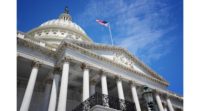Tensions between the U.S. and China continue to rise in the midst of the coronavirus pandemic, as the U.S. has issued a final rule revising the Federal Acquisition Regulation specifically to implement section 889(a)(1)(B), or “Part B.”
According to the rule, this subsection prohibits executive agencies from entering into, extending or renewing a contract with an entity that uses any equipment, system or service with the following Chinese-made telecommunications equipment or services:
- Telecommunications equipment produced by Huawei Technologies Company or ZTE Corporation (or any subsidiary or affiliate of such entities)
- For the purpose of public safety, security of government facilities, physical security surveillance of critical infrastructure and other national security purposes, video surveillance and telecommunications equipment produced by Hytera Communications Corporation, Hangzhou Hikvision Digital Technology Company or Dahua Technology Company (or any subsidiary or affiliate of such entities)
- Telecommunications or video surveillance services provided by such entities or using such equipment
- Telecommunications or video surveillance equipment or services produced or provided by an entity that the secretary of defense, in consultation with the director of national intelligence or the director of the Federal Bureau of Investigation, reasonably believes to be an entity owned or controlled by, or otherwise connected to, the government of a covered foreign country.
The rule was published in the Federal Register on July 14, and will go into effect on Aug. 13.
“This is being watched very closely in our industry due to the video surveillance equipment covered, but recently, many other industries have become quite concerned,” said Jake Parker, senior director of government relations at the Security Industry Association (SIA).
Most of the concern comes from the extremely short notice and lack of a comment period before the rule goes into effect in August. According to Parker, concern grew as time passed and Part B of the rule had not been released. Now, there isn’t even enough time for a public comment process.
“Every federal contractor from all different industries and sectors is going to need to certify their use of products,” Parker said. “This affects every security company that has a contract with the government, but also their customers who have federal contracts.”
Parker points out how widespread the use of video surveillance is across all sectors — almost every commercial building has a security system. And the Chinese video surveillance manufacturers specifically listed in the ruling — Huawei, ZTE, Hytera, Hikvision and Dahua — produce some of the most commonly used surveillance equipment on the market.
SIA and other industry associations believe the rule is not clear enough for companies to start following in August.
“This is really difficult for contractors to comply with because there may have been some actions taken so far to prepare, but until the rule came out, the contracting community was hoping for very specific definitions of terms so they could determine what uses they need to examine,” Parker said. “The rule provides some clarification, but not nearly enough. We’ve joined other trade associations in asking for delayed implementation so these issues can be worked out.”
Congress says it is passing this rule with the intent to protect federal facilities and networks from potential breaches at the hands of the Chinese government. Initially, the rule was just going to cover telecommunications. It was late in the process that video surveillance equipment was added to the ban through an amendment sponsored by Missouri Congresswoman Vicky Hartzler.
Hartzler has since offered an amendment to the 2021 defense bill that asks for the business community to have more time to review the rule and make public comments.
Senator Ron Johnson (R-WI), who chairs the Senate Homeland Security and Government Affairs Committee, has also offered an amendment that asks for implementation to be delayed until August 2021, and Rep. Virginia Foxx (R-NC) has filed a similar floor amendment to the House to delay implementation until Jan. 2022. Parker says both chambers are expected to consider these bills this month.
“We at SIA absolutely support the objectives of this provision to protect the government from potential risks from Chinese equipment,” Parker said. “We’re not trying to undo the prohibition; we just want to make sure this can be implemented by contractors in a sensible way, and what we’ve heard from global companies is that they feel there’s not enough clarity about what’s covered . . . It’s more clarity we’re seeking here, and a lot more time.”
SIA, along with other trade associations, has signed a letter the U.S. Chamber of Commerce sent to congress today, July 15, asking for a delay of implementation, partially because of the coronavirus.
“Our organizations, which represent nearly every industry segment critical to America’s economic recovery, urge lawmakers to include language in the COVID-19 phase 4 package that would defer the effective date of section 889(a)(1)(B) of the National Defense Authorization Act for Fiscal Year 2019 to August 13, 2021,” the letter states.
The letter points out that the next round of COVID-19 aid legislation is expected to be signed before the law is supposed to go into effect Aug. 13., and suggests not delaying implementation could cause a federal contracting crisis.
“Left unaddressed, Part B would jeopardize the federal government’s ability to procure the essential goods and services it needs to promote our nation’s well-being, while simultaneously placing added financial pressure on many industries that are struggling to rebound economically and keep the pandemic in check,” the letter continues.







